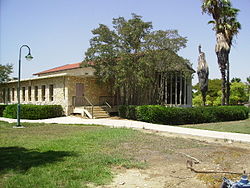Hafetz Haim
Hafetz Haim
חָפֵץ חַיִּים | |
|---|---|
 | |
| Etymology: desirous of life | |
| Coordinates: 31°47′19″N 34°48′0″E / 31.78861°N 34.80000°E | |
| Country | |
| District | Central |
| Council | Nahal Sorek |
| Affiliation | Poalei Agudat Yisrael |
| Founded | 15 August 1937 (Kfar Szold) 25 April 1944 (Hafetz Haim) |
| Founded by | German Jews Polish Agudat Yisrael Members |
| Population (2022) | 575[1] |
Hafetz Haim (Hebrew: חָפֵץ חַיִּים, lit. desirous of life) is a religious kibbutz in central Israel. Located in the Shephelah, it falls under the jurisdiction of Nahal Sorek Regional Council. In 2022 it had a population of 575.[1]
History
[edit]The land on which Hafetz Haim was established was purchased by the Jewish National Fund.[citation needed] The land had traditionally belonged to the Palestinian village of Al-Mukhayzin.[2]
The first Jewish settlement was established there on 15 August 1937 as part of the tower and stockade movement. It was named Sha'ar HaNegev, "Gate of the Negev", and then Kfar Szold, "Szold Village" (after Henrietta Szold). However, on 13 November 1942 the community moved to the Finger of the Galilee, where they established a new kibbutz, also called Kfar Szold.[citation needed]
On 25 April 1944 a new kibbutz was established. The founders were religious pioneers from Germany and members of the Ezra youth movement and Agudat Yisrael who had been preparing near Kfar Saba. It was the first village founded by Poalei Agudat Yisrael and was named after rabbi Yisrael Meir Kagan, who was also known as the Hafetz Haim after one of his famous works with the title “Chofetz Chaim”, trans. Desirer of Life.[3]

Archaeology
[edit]In 2010, a Byzantine-era octagonal wine press measuring 6.5 meters by 16.5 meters was discovered in excavations near Kibbutz Hafetz Haim.[4]
References
[edit]- ^ a b "Regional Statistics". Israel Central Bureau of Statistics. Retrieved 21 March 2024.
- ^ Khalidi, W. (1992). All That Remains: The Palestinian Villages Occupied and Depopulated by Israel in 1948. Washington D.C.: Institute for Palestine Studies. p. 398. ISBN 0-88728-224-5.
- ^ Fundamentalisms Observed, Volume 1, Martin E. Marty, R. Scott Appleby
- ^ Byzantine era wine press discovered in Nahal Sorek area Jerusalem Post
- Nahal Sorek Regional Council
- German-Jewish culture in Israel
- Kibbutzim
- Religious Israeli communities
- Populated places established in 1937
- Populated places established in 1944
- Populated places in Central District (Israel)
- 1937 establishments in Mandatory Palestine
- 1944 establishments in Mandatory Palestine
- Yekke


